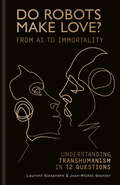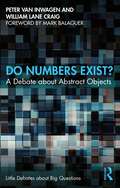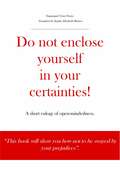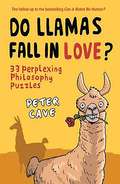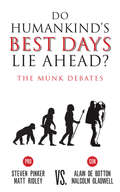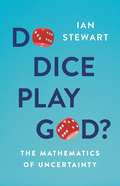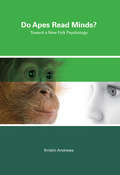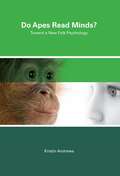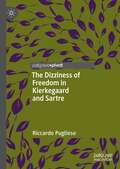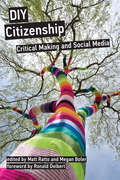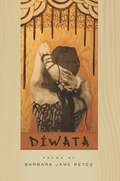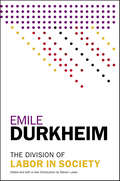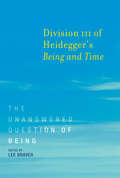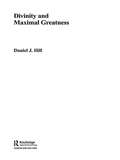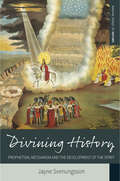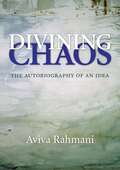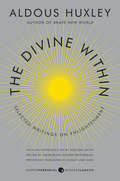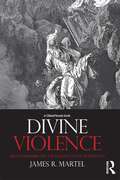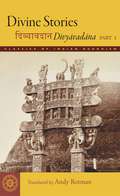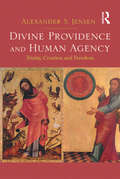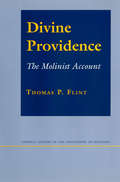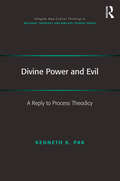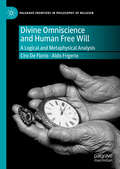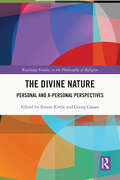- Table View
- List View
Do Robots Make Love?: From AI to Immortality – Understanding Transhumanism in 12 Questions
by Laurent Alexandre Jean-Michel BesnierShould we enhance the human condition with technology?Does anyone really want to live for a thousand years?Could AI end up destroying mankind?Discover the incredible potential of mankind's near future as Doctor and entrepreneur Laurent Alexandre and tech-philosopher Jean Michel Besnier go head to head on the big questions in an entertaining and thought-provoking debate on the fundamental principles of transhumanism.This movement seeks to improve the human condition through science - has fast become one of the most controversial the scientific community have ever faced. As great strides are made in using advanced technology to enhance human intellect and physiology, the ethical and moral questions surrounding its possibilities have never been more pressing. Should we change the way we reproduce? Could we enhance the human body with technology to the point where we are all technically cyborgs? Is it possible to make love to a robot?
Do Numbers Exist?: A Debate about Abstract Objects (Little Debates about Big Questions)
by Peter van Inwagen William Lane CraigIn Do Numbers Exist? Peter van Inwagen and William Lane Craig take opposite sides on whether there are abstract objects, such as numbers and properties. Craig argues that there are no abstract objects, whereas Van Inwagen argues that there are. Their exchange explores various arguments about the existence and nature of abstract objects. They focus especially on whether our ordinary and scientific thought and talk commit us to abstract objects, surveying the options available to us and the objections each faces. The debate covers central problems and methods in metaphysics, and also delves into theological questions raised by abstract objects.Key Features: Showcases the presentation and defense of two points of view on the existence of abstract objects, from two of the world’s leading philosophers Presents definitions in an easily accessible form Provides frequent summaries of previously covered material Includes a glossary of all specialized vocabulary
Do not enclose yourself in your certainties! A short eulogy of open-mindedness.
by Sophie Murten Emmanuel Terre-NeuveBeing open-minded is not so easy when we live in a society full of divides, damaged by tensions, prejudices and incomprehension. We find many difficulties in making our diversity a richness. The objective of this small book is not to give lessons of philosophy or morale, but to enumerate a few tools that will enable us to be less complaisant in our certainties. Open-mindedness is not decreed, it is worked on. Let’s pull up our sleeves!
Do Llamas Fall in Love?: 33 Perplexing Philosophy Puzzles
by Peter CaveIn this stunning sequel to Peter Cave's bestselling philosophy books, Can a Robot be Human? and What's Wrong with Eating People, Peter Cave once again engages the reader in a romp through the best bits of philosophical thought. With the aid of tall stories, jokes, common sense and bizarre insights, Cave tackles some of life's most important questions and introduces the puzzles that will keep you pondering throughout the night. Illustrated with quirky cartoons throughout, Do Llamas Fall in Love leaves no stone unturned, covering a smorgasbord of topics including logic, ethics, art and politics. It will provide a perfect gift for anyone who puzzles about the world! Peter Cave is a lecturer in philosophy at The Open University and City University, London, UK. He frequently contributes to philosophy magazines and journals, lectures around the world, and has scripted and presented philosophy programmes for the BBC. With worldwide sales of over 50,000 books, he is one of the leading British philosophers.
Do Humankind’s Best Days Lie Ahead?: The Munk Debates (The Munk Debates #2015)
by Steven Pinker Matt Ridley Alain de Botton Malcolm GladwellProgress. It is one of the animating concepts of the modern era. From the Enlightenment onwards, the West has had an enduring belief that through the evolution of institutions, innovations, and ideas, the human condition is improving. This process is supposedly accelerating as new technologies, individual freedoms, and the spread of global norms empower individuals and societies around the world. But is progress inevitable? Its critics argue that human civilization has become different, not better, over the last two and a half centuries. What is seen as a breakthrough or innovation in one period becomes a setback or limitation in another. In short, progress is an ideology not a fact; a way of thinking about the world as opposed to a description of reality.In the seventeenth semi-annual Munk Debates, which was held in Toronto on November 6, 2015, pioneering cognitive scientist Steven Pinker and bestselling author Matt Ridley squared off against noted philosopher Alain de Botton and bestselling author Malcolm Gladwell to debate whether humankind’s best days lie ahead.
Do Dice Play God?: The Mathematics of Uncertainty
by Ian StewartA celebrated mathematician explores how math helps us make sense of the unpredictableWe would like to believe we can know things for certain. We want to be able to figure out who will win an election, if the stock market will crash, or if a suspect definitely committed a crime. But the odds are not in our favor. Life is full of uncertainty --- indeed, scientific advances indicate that the universe might be fundamentally inexact --- and humans are terrible at guessing. When asked to predict the outcome of a chance event, we are almost always wrong. Thankfully, there is hope. As award-winning mathematician Ian Stewart reveals, over the course of history, mathematics has given us some of the tools we need to better manage the uncertainty that pervades our lives. From forecasting, to medical research, to figuring out how to win Let's Make a Deal, Do Dice Play God? is a surprising and satisfying tour of what we can know, and what we never will.
Do Apes Read Minds?: Toward a New Folk Psychology
by Kristin AndrewsAn argument that as folk psychologists humans (and perhaps other animals) don't so much read minds as see one another as persons with traits, emotions, and social relations.By adulthood, most of us have become experts in human behavior, able to make sense of the myriad behaviors we find in environments ranging from the family home to the local mall and beyond. In philosophy of mind, our understanding of others has been largely explained in terms of knowing others' beliefs and desires; describing others' behavior in these terms is the core of what is known as folk psychology. In Do Apes Read Minds? Kristin Andrews challenges this view of folk psychology, arguing that we don't consider others' beliefs and desires when predicting most quotidian behavior, and that our explanations in these terms are often inaccurate or unhelpful. Rather than mindreading, or understanding others as receptacles for propositional attitudes, Andrews claims that folk psychologists see others first as whole persons with traits, emotions, and social relations.Drawing on research in developmental psychology, social psychology, and animal cognition, Andrews argues for a pluralistic folk psychology that employs different kinds of practices (including prediction, explanation, and justification) and different kinds of cognitive tools (including personality trait attribution, stereotype activation, inductive reasoning about past behavior, and generalization from self) that are involved in our folk psychological practices. According to this understanding of folk psychology—which does not require the sophisticated cognitive machinery of second-order metacognition associated with having a theory of mind—animals (including the other great apes) may be folk psychologists, too.
Do Apes Read Minds?
by Kristin AndrewsBy adulthood, most of us have become experts in human behavior, able to make sense of the myriad behaviors we find in environments ranging from the family home to the local mall and beyond. In philosophy of mind, our understanding of others has been largely explained in terms of knowing others' beliefs and desires; describing others' behavior in these terms is the core of what is known as folk psychology. In Do Apes Read Minds? Kristin Andrews challenges this view of folk psychology, arguing that we don't consider others' beliefs and desires when predicting most quotidian behavior, and that our explanations in these terms are often inaccurate or unhelpful. Rather than mindreading, or understanding others as receptacles for propositional attitudes, Andrews claims that folk psychologists see others first as whole persons with traits, emotions, and social relations. Drawing on research in developmental psychology, social psychology, and animal cognition, Andrews argues for a pluralistic folk psychology that employs different kinds of practices (including prediction, explanation, and justification) and different kinds of cognitive tools (including personality trait attribution, stereotype activation, inductive reasoning about past behavior, and generalization from self) that are involved in our folk psychological practices. According to this understanding of folk psychology -- which does not require the sophisticated cognitive machinery of second-order metacognition associated with having a theory of mind -- animals (including the other great apes) may be folk psychologists, too.
The Dizziness of Freedom in Kierkegaard and Sartre
by Riccardo PuglieseThis book investigates the concept of freedom as it has been defined by Søren Kierkegaard and some of existentialism’s major figures, including Jean-Paul Sartre. In an attempt to delineate an ontology of the human condition, special emphasis is placed on the ideas of choice, responsibility, and transcendence. The second part of the book focuses on existential freedom in what has been its most radical formulation by Sartre. A translation of Il sentimento paralizzante del possibile. La vertigine della libertà in Kierkegaard e Sartre (2022), this book brings cutting-edge contemporary Italian philosophy to English readers.
DIY Citizenship: Critical Making and Social Media (The\mit Press Ser.)
by Megan Boler Matt RattoHow social media and DIY communities have enabled new forms of political participation that emphasize doing and making rather than passive consumption.Today, DIY—do-it-yourself—describes more than self-taught carpentry. Social media enables DIY citizens to organize and protest in new ways (as in Egypt's “Twitter revolution” of 2011) and to repurpose corporate content (or create new user-generated content) in order to offer political counternarratives. This book examines the usefulness and limits of DIY citizenship, exploring the diverse forms of political participation and “critical making” that have emerged in recent years. The authors and artists in this collection describe DIY citizens whose activities range from activist fan blogging and video production to knitting and the creation of community gardens.Contributors examine DIY activism, describing new modes of civic engagement that include Harry Potter fan activism and the activities of the Yes Men. They consider DIY making in learning, culture, hacking, and the arts, including do-it-yourself media production and collaborative documentary making. They discuss DIY and design and how citizens can unlock the black box of technological infrastructures to engage and innovate open and participatory critical making. And they explore DIY and media, describing activists' efforts to remake and reimagine media and the public sphere. As these chapters make clear, DIY is characterized by its emphasis on “doing” and making rather than passive consumption. DIY citizens assume active roles as interventionists, makers, hackers, modders, and tinkerers, in pursuit of new forms of engaged and participatory democracy.ContributorsMike Ananny, Chris Atton, Alexandra Bal, Megan Boler, Catherine Burwell, Red Chidgey, Andrew Clement, Negin Dahya, Suzanne de Castell, Carl DiSalvo, Kevin Driscoll, Christina Dunbar-Hester, Joseph Ferenbok, Stephanie Fisher, Miki Foster, Stephen Gilbert, Henry Jenkins, Jennifer Jenson, Yasmin B. Kafai, Ann Light, Steve Mann, Joel McKim, Brenda McPhail, Owen McSwiney, Joshua McVeigh-Schultz, Graham Meikle, Emily Rose Michaud, Kate Milberry, Michael Murphy, Jason Nolan, Kate Orton-Johnson, Kylie A. Peppler, David J. Phillips, Karen Pollock, Matt Ratto, Ian Reilly, Rosa Reitsamer, Mandy Rose, Daniela K. Rosner, Yukari Seko, Karen Louise Smith, Lana Swartz, Alex Tichine, Jennette Weber, Elke Zobl
Diwata (American Poets Continuum #123)
by Barbara Jane ReyesTagalog is a language spoken by twenty-two million people in the Philippines. Diwata is a Tagalog term meaning "muse." Diwata is also a term for a mythical being who resides in nature, and who human communities must acknowledge, respect, and appease in order to live harmoniously in this world.In her book Diwata, Barbara Jane Reyes frames her poems between the Book of Genesis creation story and the Tagalog creation myth, placing her work somewhere culturally between both traditions. Also setting the tone for her poems is the death and large shadow cast by her grandfather, a World War II veteran and Bataan Death March survivor, who has passed onto her the responsibility of remembering. Reyes' voice is grounded in her community's traditions and histories, despite war and geographical dislocation.From "Estuary 2":She was born with fins and fishtail,A quick blade slicing water.She was her father's mermaid child,A river demon, elders said.She mimicked her cetaceous brothers,Abalone diving bluest depths.She polished smooth her brothers' masks,Inlaid nacre half moon eyes.She lit oak pyres and bade the windA whispered requiem.Barbara Jane Reyes is author of two previous poetry collections including Poeta en San Francisco, which was awarded the 2005 James Laughlin Award from the Academy of American Poets. She was born in Manila and raised in the San Francisco Bay Area. She works as adjunct professor in Philippine studies at the University of San Francisco.From National Book Critics Circle:"Diwata as a mythological invocation takes teh reader back to pre-colonial Philippines when the belief in these god and goddesses shaped the everyday lives on the Southeast Asian archipelago. They have now become your muses as you reach toward this cultural legacy to shape a distinct postmodern poetics in which yo u don’t simply erase colonial history- you build with that narrative as well."
Diwata
by Barbara Jane ReyesTagalog is a language spoken by twenty-two million people in the Philippines. Diwata is a Tagalog term meaning "muse." Diwata is also a term for a mythical being who resides in nature, and who human communities must acknowledge, respect, and appease in order to live harmoniously in this world.In her book Diwata, Barbara Jane Reyes frames her poems between the Book of Genesis creation story and the Tagalog creation myth, placing her work somewhere culturally between both traditions. Also setting the tone for her poems is the death and large shadow cast by her grandfather, a World War II veteran and Bataan Death March survivor, who has passed onto her the responsibility of remembering. Reyes' voice is grounded in her community's traditions and histories, despite war and geographical dislocation.From "Estuary 2":She was born with fins and fishtail,A quick blade slicing water.She was her father's mermaid child,A river demon, elders said.She mimicked her cetaceous brothers,Abalone diving bluest depths.She polished smooth her brothers' masks,Inlaid nacre half moon eyes.She lit oak pyres and bade the windA whispered requiem.Barbara Jane Reyes is author of two previous poetry collections including Poeta en San Francisco, which was awarded the 2005 James Laughlin Award from the Academy of American Poets. She was born in Manila and raised in the San Francisco Bay Area. She works as adjunct professor in Philippine studies at the University of San Francisco.From National Book Critics Circle:"Diwata as a mythological invocation takes teh reader back to pre-colonial Philippines when the belief in these god and goddesses shaped the everyday lives on the Southeast Asian archipelago. They have now become your muses as you reach toward this cultural legacy to shape a distinct postmodern poetics in which yo u don't simply erase colonial history- you build with that narrative as well."
The Division of Labor in Society (Contemporary Social Theory Ser.)
by Emile DurkheimRevised for the first time in over thirty years, this edition of Emile Durkheim’s masterful work on the nature and scope of sociology is updated with a new introduction and improved translation by leading scholar Steven Lukes that puts Durkheim’s work into context for the twenty-first century reader.When it was originally published, The Division of Labor in Society was an entirely original work on the nature of labor and production as they were being shaped by the industrial revolution. Emile Durkheim’s seminal workstudies the nature of social solidarity and explores the ties that bind one person to the next in order to hold society together.This revised and updated second edition fluently conveys Durkheim’s arguments for contemporary readers. Leading Durkheim scholar Steve Lukes’s new introduction builds upon Lewis Coser’s original—which places the work in its intellectual and historical context and pinpoints its central ideas and arguments. Lukes explains the text’s continued significance as a tool to think about and deal with problems that face us today. The original translation has been revised and reworked in order to make Durkheim’s arguments clearer and easier to read.The Division of Labor in Society is an essential resource for students and scholars hoping to deepen their understanding of one of the pioneering voices in modern sociology and twentieth-century social thought.
Division III of Heidegger's Being and Time: The Unanswered Question of Being
by Lee BraverLeading philosophers and scholars speculate on what Heidegger's unfinished masterpiece might have said, why Heidegger didn't publish it, and what being actually means.Heidegger's Being and Time is one of the most influential and important books in the history of philosophy, but it was left unfinished. The parts we have of it, Divisions I and II of Part One, were meant to be merely preparatory for the unwritten Division III, which was to have formed the point of the entire book when it turned to the topic of being itself. In this book, leading Heidegger scholars and philosophers influenced by Heidegger take up the unanswered questions in Heidegger's masterpiece, speculating on what Division III would have said, and why Heidegger never published it. The contributors' task—to produce a secondary literature on a nonexistent primary work—seems one out of fiction by Borges or Umberto Eco. Why did Heidegger never complete Being and Time? Did he become dissatisfied with it? Did he judge it too subjectivistic, not historical enough, too individualistic, too existential? Was abandoning it part of Heidegger's “Kehre”, his supposed turning from his early work to his later work? Might Division III have offered a bridge between the two phases, if a division exists between them? And what does being mean, after all? The contributors, in search of lost Being and Time, consider these and other topics, shedding new light on Heidegger's thought.ContributorsAlain Badiou, Lee Braver, Daniel Dahlstrom, Charles Guignon, Graham Harman, Karsten Harries, Ted Kisiel, Denis McManus, Eric S. Nelson, Richard Polt, François Raffoul, Thomas Sheehan, Iain Thomson, Kate Withy, Julian Young
Divinity and Maximal Greatness (Routledge Studies in the Philosophy of Religion)
by Daniel HillThis book examines the divine nature in terms of maximal greatness. It investigates each attribute associated with maximal greatness - omnipotence, omniscience, perfect goodness, eternity, and beauty, arguing that maximal greatness is necessary and sufficient for divinity.
Divining History: Prophetism, Messianism and the Development of the Spirit (Making Sense of History #26)
by Jayne SvenungssonFor millennia, messianic visions of redemption have inspired men and women to turn against unjust and oppressive orders. Yet these very same traditions are regularly decried as antecedents to the violent and authoritarian ideologies of modernity. Informed in equal parts by theology and historical theory, this book offers a provocative exploration of this double-edged legacy. Author Jayne Svenungsson rigorously pursues a middle path between utopian arrogance and an enervated postmodernism, assessing the impact of Jewish and Christian theologies of history on subsequent thinkers, and in the process identifying a web of spiritual and intellectual motifs extending from ancient Jewish prophets to contemporary radicals such as Giorgio Agamben and Slavoj Zizek.
Divining Chaos: The Autobiography of an Idea
by Aviva RahmaniA spirited memoir by artist Aviva Rahmani, offering a relatable narrative to discuss trigger point theory and the importance of eco-art activism.Divining Chaos is an intimate personal memoir of unparalleled transparency into the moments in Rahmani's life that shaped her as an artist and activist. Detailing the history that led her to two seminal projects—Ghost Nets, restoring a coastal town dump to flourishing wetlands, and The Blued Trees Symphony, which applied her premises to challenge natural gas pipelines with a novel legal theory about land use—Rahmani shares the decisions that shaped her life’s work and thinking. Her discussions about trigger point theory argue for how to predict, confront, and determine outcomes to the ecological challenges we face today.
The Divine Within
by Aldous HuxleyBrave New World author Aldous Huxley on enlightenment and the "ultimate reality"In this anthology of twenty-six essays and other writings, Huxley discusses the nature of God, enlightenment, being, good and evil, religion, eternity, and the divine. Huxley consistently examined the spiritual basis of both the individual and human society, always seeking to reach an authentic and clearly defined experience of the divine. Featuring an introduction by renowned religious scholar Huston Smith, this celebration of "ultimate reality" proves relevant and prophetic in addressing the spiritual hunger so many feel today.
Divine Violence: Walter Benjamin and the Eschatology of Sovereignty
by James R. MartelDivine Violence looks at the question of political theology and its connection to sovereignty. It argues that the practice of sovereignty reflects a Christian eschatology, one that proves very hard to overcome even by left thinkers, such as Arendt and Derrida, who are very critical of it. These authors fall into a trap described by Carl Schmitt whereby one is given a (false) choice between anarchy and sovereignty, both of which are bound within—and return us to—the same eschatological envelope. In Divine Violence, the author argues that Benjamin supplies the correct political theology to help these thinkers. He shows how to avoid trying to get rid of sovereignty (the "anarchist move" that Schmitt tells us forces us to "decide against the decision") and instead to seek to de-center and dislocate sovereignty so that it’s mythological function is disturbed. He does this with the aid of divine violence, a messianic force that comes into the world to undo its own mythology, leaving nothing in its wake. Such a move clears the myths of sovereignty away, turning us to our own responsibility in the process. In that way, the author argues,Benjamin succeeds in producing an anarchism that is not bound by Schmitt’s trap but which is sustained even while we remain dazzled by the myths of sovereignty that structure our world. Divine Violence will be of interest to students of political theory, to those with an interest in political theology, philosophy and deconstruction, and to those who are interested in thinking about some of the dilemmas that the ‘left’ finds itself in today.
Divine Stories
by Andy RotmanDivine Stories is the inaugural volume in a landmark translation series devoted to making the wealth of classical Indian Buddhism accessible to modern readers. The stories here, among the first texts to be inscribed by Buddhists, highlight the moral economy of karma, illustrating how gestures of faith, especially offerings, can bring the reward of future happiness and ultimate liberation. Originally contained in the Divyavadana, an enormous compendium of Sanskrit Buddhist narratives from the early Common Era, the stories in this collection express the moral and ethical impulses of Indian Buddhist thought and are a testament to the historical and social power of narrative. Long believed by followers to be the actual words of the Buddha himself, these divine stories are without a doubt some of the most influential stories in the history of Buddhism.
Divine Providence and Human Agency: Trinity, Creation and Freedom
by Alexander S. JensenDivine Providence and Human Agency develops an understanding of God and God's relation to creation that perceives God as sovereign over creation while, at the same time, allowing for a meaningful notion of human freedom. This book provides a bridge between contemporary approaches that emphasise human freedom, such as process theology and those influenced by it, and traditional theologies that stress divine omnipotence.This book argues that it is essential for Christian theology to maintain that God is ultimately in charge of history: otherwise there would be no solid grounds for Christian hope. Yet, the modern human self-understanding as free agent within certain limitations must be taken seriously. Jensen approaches this apparent contradiction from within a consistently trinitarian framework. Jensen argues that a Christian understanding of God must be based on the experience of the saving presence of Christ in the Church, leading to an apophatic and consistently trinitarian theology. This serves as the framework for the discussion of divine omnipotence and human freedom. On the basis of the theological foundation established in this book, it is possible to frame the problem in a way that makes it possible to live within this tension. Building on this foundation, Jensen develops an understanding of history as the unfolding of the divine purpose and as an expression of God's very being, which is self-giving love and desire for communion. This book offers an important contribution to the debate of the doctrine of God in the context of an evolutionary universe.
Divine Providence: The Molinist Account (Cornell Studies in the Philosophy of Religion)
by Thomas P. FlintThomas P. Flint develops and defends the idea of divine providence sketched by Luis de Molina, the sixteenth-century Jesuit theologian. The Molinist account of divine providence reconciles two claims long thought to be incompatible: that God is the all-knowing governor of the universe and that individual freedom can prevail only in a universe free of absolute determinism. The Molinist concept of middle knowledge holds that God knows, though he has no control over, truths about how any individual would freely choose to act in any situation, even if the person never encounters that situation. Given such knowledge, God can be truly providential while leaving his creatures genuinely free. Divine Providence is by far the most detailed and extensive presentation of the Molinist view ever written.Middle knowledge is hotly debated in philosophical theology, and the controversy spills over into metaphysics and moral philosophy as well. Flint ably defends the concept against its most influential contemporary critics, and shows its importance to Christian practice. With particular originality and sophistication, he applies Molinism to such aspects of providence as prayer, prophecy, and the notion of papal infallibility, teasing out the full range of implications for traditional Christianity.
Divine Power and Evil: A Reply to Process Theodicy (Routledge New Critical Thinking in Religion, Theology and Biblical Studies)
by Kenneth K. PakEvil perplexes us all and threatens to undermine the meaningfulness of our existence. How can we reconcile the reality of evil with the notion of a God who is perfectly good and powerful? Process theodicy, whose foremost proponent is David Griffin, suggests one answer: because every being possesses its own power of self-determination in order for God to attain the divine aim of higher goodness for the world, God must take the risk of the possibility of evil. Divine Power and Evil responds to Griffin's criticisms against traditional theodicy, assesses the merits of process theodicy, and points out ways in which traditional theism could incorporate a number of Griffin's valuable insights in progressing toward a philosophically and theologically satisfactory theodicy. It provides a new and important contribution to a long-standing debate within philosophy of religion and theology.
Divine Omniscience and Human Free Will: A Logical and Metaphysical Analysis (Palgrave Frontiers in Philosophy of Religion)
by Ciro De Florio Aldo FrigerioThis book deals with an old conundrum: if God knows what we will choose tomorrow, how can we be free to choose otherwise? If all our choices are already written, is our freedom simply an illusion? This book provides a precise analysis of this dilemma using the tools of modern metaphysics and logic of time. With a focus on three intertwined concepts - God’s nature, the formal structure of time, and the metaphysics time, including the relationship between temporal entities and a timeless God - the chapters analyse various solutions to the problem of foreknowledge and freedom, revealing the advantages and drawbacks of each. Building on this analysis, the authors advance constructive solutions, showing under what conditions an entity can be omniscient in the presence of free agents, and whether an eternal entity can know the tensed futures of the world. The metaphysics of time, its topology and the semantics of future tensed sentences are shown to be invaluable topics in dealing with this issue. Combining investigations into the metaphysics of time with the discipline of temporal logic this monograph brings about important advancements in the philosophical understanding of an ancient and fascinating problem. The answer, if any, is hidden in the folds of time, in the elusive nature of this feature of reality and in the infinite branching of our lives.
The Divine Nature: Personal and A-Personal Perspectives (Routledge Studies in the Philosophy of Religion)
by Georg Gasser Simon KittleThis book is the first systematic treatment of the strengths and limitations of personal and a-personal conceptions of the divine. It features contributions from Jewish, Islamic, Chinese, Indian and naturalistic backgrounds in addition to those working within a decidedly Christian framework. This book discusses whether the concept of God in classical theism is coherent at all and whether the traditional understanding of some of the divine attributes need to be modified. The contributors explore what the proposed spiritual and practical merits and demerits of personal and a-personal conceptions of God might be. Additionally, their diverse perspectives reflect a broader trend within the analytic philosophy of religion to incorporate various non-Western religious traditions. Tackling these issues carefully is needed to do justice to the strengths and limitations of personal and a-personal accounts to the divine. The Divine Nature: Personal and A-Personal Perspectives will be of interest to scholars and advanced students working in philosophy of religion and philosophical theology.
